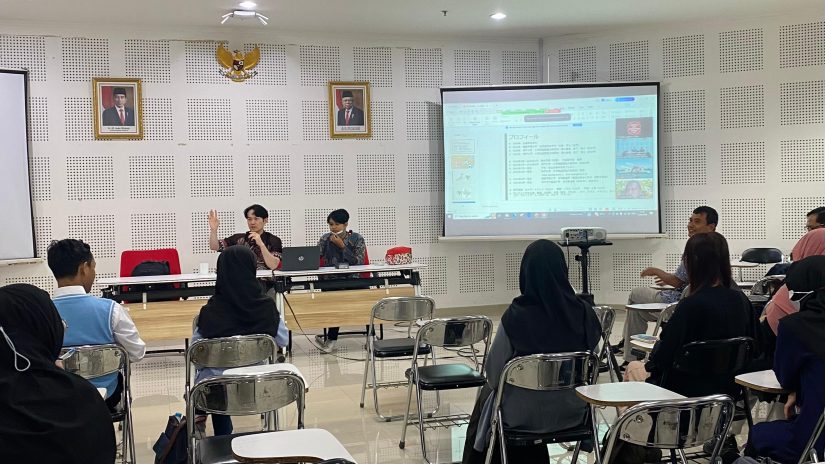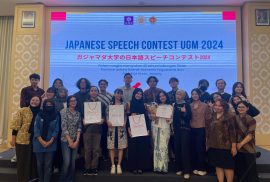
On Tuesday, February 13, 2024, from 1:00 PM to 3:00 PM WIB, the Bachelor Program in Japanese Language and Culture at Universitas Gadjah Mada held a public lecture titled “Will Japan become a ‘normal country’?: Changes in The Defense Debate Before And After the Outbreak of The Ukraine War,” presented by Asst. Prof. Masato Nakahara, a researcher and lecturer at the Graduate School of International Cooperation Studies at Kobe University. This public lecture served as an opening for the even semester of the 2023/2024 academic year and was attended by lecturers and students from the Bachelor Program in Japanese Language and Culture, as well as students from outside the program interested in Japanese-related issues.
In the initial part, Asst. Prof. Nakahara outlined the history of the formation of the Japan Self-Defense Forces (Jieitai) after Japan’s defeat in World War II and the changes in the status of Jieitai during the Allied occupation, as regulated by the current Constitution. The limitations on Jieitai’s activities imposed by the Constitution of Japan have made Japan’s military actions very restricted, even in the context of overseas conflicts like the ongoing war between Russia and Ukraine. Japan’s position regarding global security and peace has become dilemmatic, as sending military troops abroad violates the mandate of the Constitution of Japan, while the international community demands an active role from Japan in such military engagements. Particularly now, as the global political landscape shifts dynamically after the Cold War, Japan, which is expected to prioritize peace as mandated by the Constitution of Japan, must seek a new interpretation to become a “normal” country—one that can maintain sovereignty while also contributing to world peace.
Following Asst. Prof. Nakahara’s presentation, the public lecture continued with a discussion and Q&A session that was lively and featured various questions from participants regarding Japan’s stance and position in relation to international conflicts, the geopolitical changes in East Asia, and Indonesia.
Understanding Japan’s position in the context of global changes is considered important for the academic community of the program, as it not only serves as an update on current issues related to Japan but also provides a platform for learning and inspiration for research themes concerning Japanese matters. Moreover, forums like this can enhance collaboration between the program and foreign institutions, helping to facilitate its academic community in becoming more globally engaged, in line with one of the Millennium Development Goals (MDGs), which is to develop global partnerships for development.



